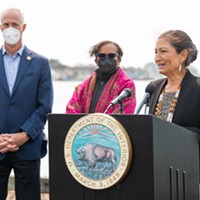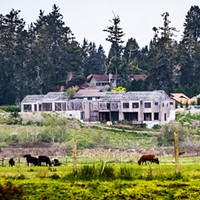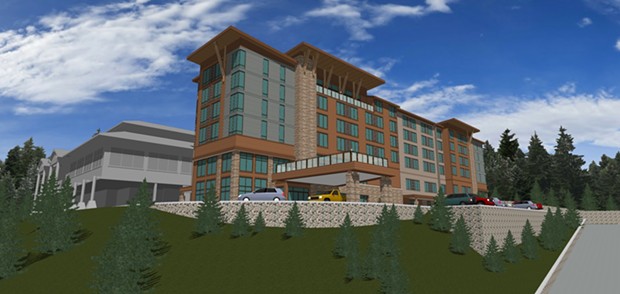Questions Swirl Ahead of Trinidad Hotel Hearing
A potential well site and an ethics complaint bubble up on eve of coastal commission hearing
By Thadeus Greenson [email protected] @ThadeusGreenson and Elaine Weinreb[
{
"name": "Top Stories Video Pair",
"insertPoint": "7",
"component": "17087298",
"parentWrapperClass": "fdn-ads-inline-content-block",
"requiredCountToDisplay": "1"
}
]
At the 11th hour, with a hearing looming before the California Coastal Commission next week, the Trinidad Rancheria believes it may have found a water source for its proposed hotel development on Scenic Drive.
The commission is set to meet Aug. 8 in Eureka, two months after a divided commission voted 6-3 in San Diego to object to the Bureau of Indian Affairs' determination that the project was consistent with the protections laid out in the California Coastal Act. Specifically, commissioners repeatedly voiced concerns over the Rancheria's ability to find a water source for the 100-room hotel, noting that the city of Trinidad had not yet committed to supplying water from its system as it conducts a number of studies to determine whether its capacity can meet current and future needs for the city and its service area.
Word that the Rancheria may have found a different water source first surfaced when commission staff posted an ex parte communication disclosure form from Commission Chair Dayna Bochco, who reported that she'd received a text message at 9:25 p.m. on July 23 from former Coastal Commissioner and Humboldt County Supervisor Ryan Sundberg, who currently works as the interim general manager of the Rancheria's Cher-Ae Heights Casino.
"Hi Dayna, we have had a (drilling) rig looking for well water so we don't have to depend on the city of Trinidad," Sundberg wrote. "Today was very exciting. We hit water today and will be able to have well water treated and used for the hotel. Can't wait to see you all when you come up next month!"
The information contained in the text message doesn't appear to be included in the commission's staff report or any of its appendixes, which focus on the Rancheria's ongoing efforts to get water from the city, while also noting the Rancheria is looking at the possibility of using an atmospheric water generator to supply or supplement water.
Trinidad Rancheria Economic Development Corporation CEO David Tyson confirmed in an email to the Journal that the Rancheria has identified a potential water source on its property for the project but indicated additional information is needed.
"I can confirm the Rancheria has identified an independent water source on the Rancheria property," he wrote July 29. "They are working with their drilling company and engineers to establish quality and quantity of the water source. More information to follow as the Rancheria will be providing the BIA and Coastal Commission with greater details than what I have available to share today."
The California Political Reform Act prohibits state officials from lobbying their former agencies for one year after they leave office. The law specifically includes members of state boards and commissions with decision-making authority and is also written to specifically include electronic communications intended to "influence proceedings involving a permit, license, contract or transaction..."
While there's no indication Sundberg was or is being paid by the Rancheria explicitly to act as a lobbyist for this project, his text notifying Bochco of project developments would constitute lobbying, according to Cory Briggs, who serves as general counsel for the nonprofit watchdog Spotlight on Coastal Corruption.
"It's lobbying," he said of the text message. "That's exactly what it is."
While California law does allow for criminal prosecutions of violations of the Political Reform Act, the vast majority of complaints and enforcement are handled through an administrative process, according to the Fair Political Practices Commission. FPPC Communications Director Jay Wierenga tells the Journal that the commission did receive a complaint against Sundberg on July 29 but couldn't yet comment on who submitted it or its substance.
Bochco, an attorney and television producer who was first appointed to the commission in 2011, is one of 12 of the commission's 20 current members who does not accept ex parte meeting or correspondence requests from the general public, according to the commission's website.
The project is slated to come back before the commission Aug. 8 for what's known as a consistency vote, when the commission will decide whether to object to the BIA's determination that the project is consistent with California's coastal protection laws. Because the Trinidad Rancheria is a sovereign nation, it isn't bound by local zoning and regulatory laws but its projects fall under the purview of the BIA and a federal environmental review process, which takes into account state laws. If the commission again objects to the bureau's determination, the bureau could opt to proceed with approving the project anyway, work with the commission to resolve its concerns or enter mediation.
The Rancheria has touted the five-story hotel project as a way to bring economic development to its members but some in the local community have raised concerns over the project's impact on water, traffic and the scenic nature of the bluffs south of Trinidad.
But the main focus of the commission's concerns has been the ability of the Rancheria to secure a viable water source, which spurred commission staff to recommend the commission "object" to the BIA's determination at its June meeting, the commission ultimately following suit and commission staff again recommending an "objection" vote heading into the Aug. 8 meeting.
Some had hoped the extra two months between the commission hearing would allow the city of Trinidad the time it needed to fully assess its water supply and determine whether it could supply the project but that appears not to be the case.
On April 16, the Trinidad Rancheria sent a letter to the city of Trinidad requesting that the city provide service to the planned hotel but did not yet know the amount of water that would be required, and did not offer a date as to when that information would be available.
For the past few months, the city has been conducting a series of studies evaluating its capacity to provide water to customers. The first study, which was completed on May 1, dealt only with the capacity of the water treatment plant to process and treat drinking water. The study highlighted several limiting factors, including the high turbidity of winter stream water, which drastically increases the treatment time needed to make the water potable, reducing the net daily output of the plant. Basically the study concluded that although the treatment plant was adequate for the city's present population, it could not predict how much growth the treatment plant could handle. An available supply of excess water is needed to handle emergency situations, ranging from a malfunction in the plant to providing the super-strong flows needed for firefighting.
The report stated "it is not known if the existing system meets today's standards for fire protection flows" and concluded that "additional evaluations are needed before making obligations for additional water supply to meet future service requests."
That first study did not address the issue that the city has expressed the most concern about — how much water is available in the Luffenholz Creek watershed. On June 26, the Trinidad City Council voted to have its city engineer produce an assessment of Luffenholtz Creek with an emphasis on low-flows and the potential risks from future droughts and climate change. The study, which will also address storage and delivery constraints of the water system, is scheduled to be completed in October.
At the July 17 Trinidad Planning Commission meeting, staff reported on a build-out assessment, essentially an estimate of how much water would be required to supply every buildable parcel within city limits and within the city's service area.
"Inside the city, the city is obligated to hook everybody up," a city planner explained. The service area is actually outside city limits and is an area where "the city has discretion on hooking people up."
Serving the entire service area is not within the water plant's current capacity, she stated. Although the city has water rights for the creek, others on the creek also have water rights and there may not be enough capacity in the creek for everybody, especially during drought years, she said.
So it appears the city still has months of fact-finding ahead of it before, according to a July 23 letter to the commission, it will begin a policy discussion on the matter.
"Although the initial technical work underway is planned for completion within the next several months, this work will not tell the city whether a particular water supply request should be granted," the letter states. "Rather, it will inform policy development that will take some time to complete. The city will develop policy through an interactive public process, which will likely evolve over multiple meetings supported by the city's technical contractors."
So the project will enter its Aug. 8 re-hearing — essentially a do-over of the one held two months earlier intended to give the city and the Trinidad Rancheria more time to address unanswered questions — with questions still unanswered. And it's still entirely unclear what the Trinidad Rancheria's recently discovered "independent water source" can provide, and whether it might be enough to move the project forward.
Speaking of...
-

Huffman, Haaland to Visit Humboldt Bay Amid Growing Tribal Offshore Wind Opposition
Mar 26, 2024 -

Despite Coastal Commission Appeal, Schneider Mansion Demolition, Restoration Could be Complete by July
Jan 9, 2024 -

California Water Agency Under Investigation for Discriminating Against Tribes, People of Color
Aug 10, 2023 - More »
Comments (2)
Showing 1-2 of 2
More by Elaine Weinreb
-
Trouble on the Mountain
A popular outdoor recreation area is also a makeshift shooting range, causing growing safety concerns
- Jan 11, 2024
-
Port of Entry
Harbor District begins environmental review for project to turn Humboldt Bay into a wind farm manufacturing hub
- Jul 27, 2023
- More »
More by Thadeus Greenson
-
Deputy Shoots Cutten Shooting Suspect
- Apr 25, 2024
-
Officials Weigh in on SCOTUS Case's Local Implications
- Apr 25, 2024
-
Arcata Lowers Earth Flag as Initiative Proponents Promise Appeal
- Apr 25, 2024
- More »
Latest in News
Readers also liked…
-
Through Mark Larson's Lens
A local photographer's favorite images of 2022 in Humboldt
- Jan 5, 2023
-
'To Celebrate Our Sovereignty'
Yurok Tribe to host gathering honoring 'ultimate river warrior' on the anniversary of the U.S. Supreme Court ruling that changed everything
- Jun 8, 2023
































